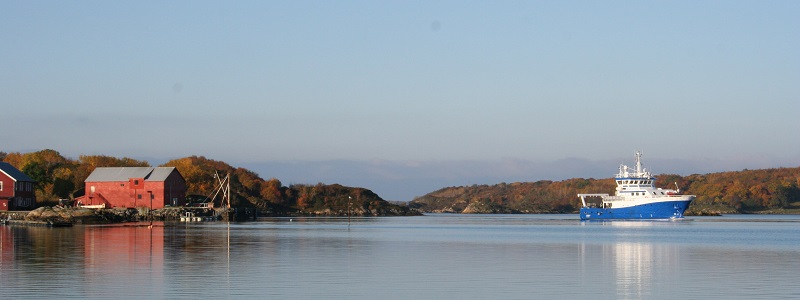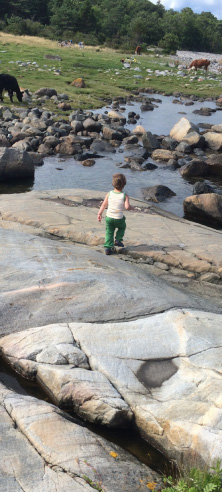Norway as a sea nation - Oceans

NTNU Oceans Pilot Programme Norway as a Sea Nation
Coastal communities, generations, sustainability

This project aims to establish a deeper knowledge base of the dynamic interplay between education, identity and society across three generations in coastal communities in five countries.
Head of Pilot programme: Professor Anne Trine Kjørholt
Norway is a sea nation, where coastal communities are in transition. Children and young people represent the key to create sustainable coastal communities in the future.
Norway as a sea nation focuses on coastal communities, generations and sustainability. Local identity, well-being and a sense of belonging to place and nature are important. Across three generations and five countries (Norway, Australia, Ireland, Cyprus and Faroe Islands), the programme explores work, everyday life and knowledge among children and their families, past and present.
Norway as a sea nation (2016-2023) includes the international comparative research project Valuing the past, sustaining the future. Education, knowledge and identities across three generations in coastal communities across five countries, funded by the Research Council of Norway (2016-2021).
The overall aim of the project is to establish a deeper knowledge base of the dynamic interplay between education, identity and society across three generations in coastal communities in five countries.
Final conference
The research project "Norway as a Sea Nation" is coming to an end and is planning its final conference: Sustaining, knowing and ‘living’ the Blue? Coastal communities as places to belong across generations, on 15-16 June 2023.
More information about the conference and how to partcipate.
Valuing the past, sustaining the future
Children and young people represent the key to create sustainable coastal communities in the future. The pilot programme on Norway as a sea nation: Coastal communities, generation, sustainability, aims at establishing a deeper knowledge base of the dynamic interplay between coastal communities in transition, knowledge production, identities and working life. Childhood and intergenerational relations represent a particular focus of investigation.
Across generations and five countries, the programme explores work, every day life and knowledge among children and their families, with a particular focus on how informal learning and local knowledge are experienced, transmitted, shared and practiced by children of diverse ethnic origins. Innovative models and practices will be developed for intergenerational and intercultural transmission of knowledge in schools and communities, in collaboration with local communities and businesses.
The research is innovative by applying a comparative and multigenerational methodological approach, aimed at in-depth understanding. Case studies will be conducted with young people who have a higher drop-out tendency, including vocational, migrant and indigenous students in addition to ethnic Norwegian students in general studies. Biographical approach will be employed, exploring narratives of education, knowledge and work among youth (15-18 years), their parents and grandparents.
Research team at NTNU
Professor Anne Trine Kjørholt, IPL, Norway as a Sea Nation
Associate professor Thomas Brandt, Department of Historical Studies, 3ROceans
PhD Candidate Sarah Dahle Hermanstad, Department of Historical Studies, 3ROceans
PhD Candidate Christopher Messelt, Department of Language and Litterature
Professor Linn Okkenhaug Getz, Deppartment of Public Health and Nursing, Norway as a Sea Nation
Professor Johann A. Sigurdsson, Department of Public Health and Nursing, Norway as a Sea Nation
PhD Candidate Miriam Hjeldsbakken Engevold, Department of Health Sciences, Norway as a Sea Nation
PhD Candidate (to be hired in January 2018)
PhD candidates
Christopher Messelt, PhD candidate at the Section for Comparative Literature, Department of Language and Literature – The Norwegian University of Science and Technology. Project title: «Norway as a literary sea nation. Coast, sea, generations»
Tobias Johansson, PhD candidate at the Department of education and lifelong learning, NTNU. Project title: “Intergenerational pedagogical methods in a coastal context”
Inger T. Pedersen, PhD candidate at the Department of education and lifelong learning, NTNU. Project title: “Life stories about everyday life, local knowledge and identity in three generations in a coastal Sami community”.
Sofie Hjorthen, PhD candidate at the HUNT Research Centre, Department of Public Health and Nursing, NTNU. Project title: “Coastal communities: Generations, health and sustainability”
Miriam Hjeldsbakken Engevold, Department of Health Sciences in Gjøvik, NTNU. Project title: “Psychosocial health, identity and wellbeing across three generations; A comparative study of two communities”
Aoife Crummy, School of Education, University College Dublin, project title: 'Intergenerational change in small Irish coastal communities'
